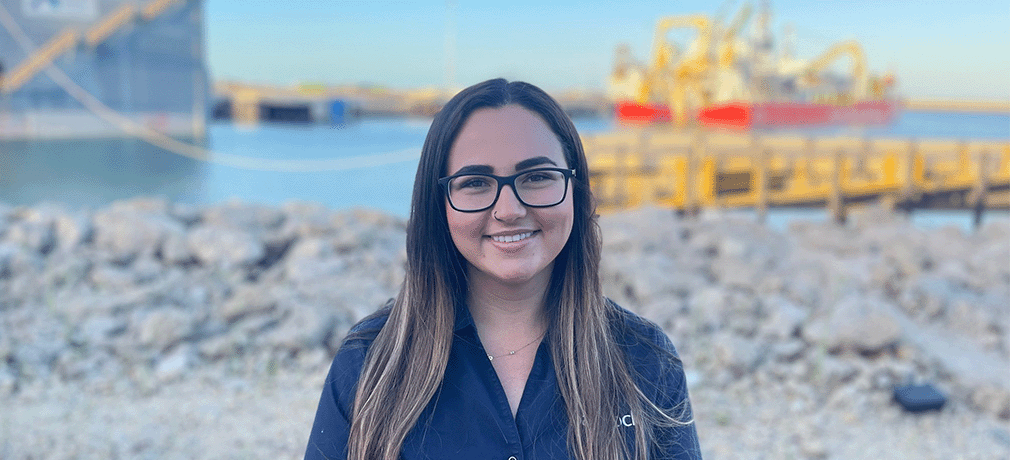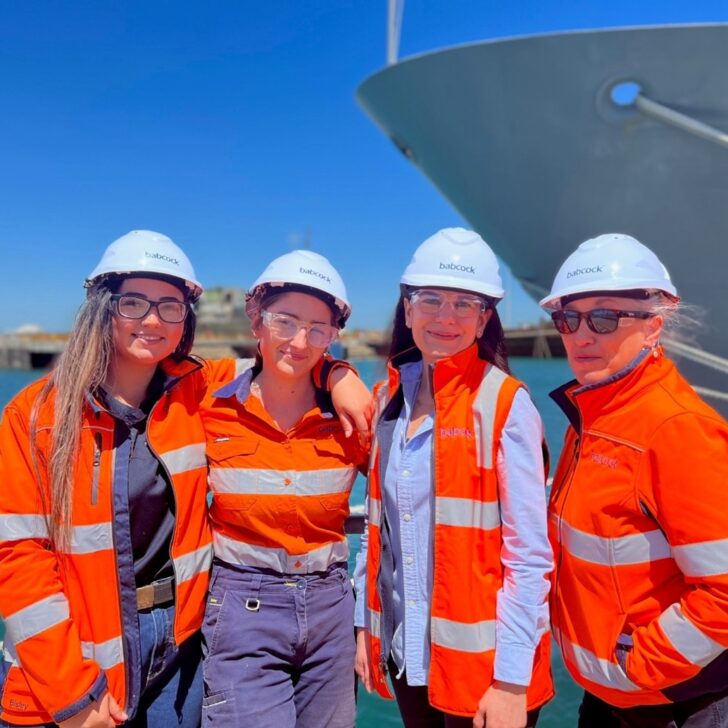In an industry often characterised by tradition and convention, Babcock Australasia Production Manager Sophee Clark is breaking the mould with a refreshing hint of individuality, determination and challenge to the defence status quo.
When Sophee Clark interviewed for her first job in defence at age 18, she bullishly told the General Manager who was looking to hire her that one day she’d be sitting in his seat.
Three years later, when that same boss encouraged her to apply for an administration role at Naval Ship Management, (now Babcock Australasia), she talked her way into a promotion during the interview.
It was unsurprising then, when pursuing higher duties a year into her career with Babcock, that she again took an unorthodox approach.
Instead of a resume, she presented the interview panel with a family tree of the high-achieving men in her lineage; her great grandfather, who fought at Gallipoli; her grandfather, knighted by Her Late Majesty Queen Elizabeth II for his service in Port Moresby and Papua New Guinea; her father, an awarding winning project manager in civil and defence facility construction; and her brother, with three degrees, including a master’s in cyber security, to his name.
While immensely proud of her family, she explained that it was time for some female representation amongst its lengthy line of male leaders. And she wanted Babcock to know she was serious about carving out a legacy of her own.
Young talent time
In the five years since joining the global defence Prime, Sophee has earnt herself three promotions, working her way up to become one of its leading marine production managers. Today she oversees the servicing and maintenance of the Royal Australian Navy’s (RAN) Anzac Class frigates as part of Babcock’s role in the Warship Asset Management Alliance (WAMA) at Henderson.
Her success in the role has earned her a coveted spot on this year’s Australian Defence Magazine’s 30 Under 30 list – an accolade recognising the best and brightest young talent in Australia’s defence sector.
“The defence industry offers a unique opportunity to work on projects that have a significant impact on the world,” Sophee said.
“My goal was to become a production manager by the time I was 30 because I want to be in the thick of delivering programs that matter. I did it by 25.”
Glass ceiling
Navigating such a rapid rise has not been without its challenges though, particularly in a traditionally male-dominated industry where longevity often holds weight.
“I’ve been very lucky in my career to have had senior managers who have seen the value of my work and the effort I put in. But that doesn’t mean others automatically see it,” Sophee said.
“In the early days before joining Babcock, I would often hear, ‘Did you get the role because you’re a woman?’. I’ve had circumstances where I’ve been promoted above someone who is 20 years my senior, which can be tricky, right? They didn’t understand until working for me the value I could bring.”
Sophee has been pragmatic in the face of such criticism, preferring to let her work do the talking.
“I don’t have an engineering or technical background but what I can do is build relationships. As long as they get from A to B following all the right processes, I’m not here to tell people how to spin the spanner. I am here to support them,” she said.
“It’s about facilitating an open and accessible environment, where there are clear expectations and understanding of responsibilities. I find that by demonstrating confidence in my team and their ability to complete a project, they are more willing to go above and beyond.”
The approach is working.
“The success of the projects I run and how we work together as a collective, both internally and with the Commonwealth, is what is building my reputation in the industry,” she said.
“I’ve had people who have actively dismissed me because of my age or gender turnaround six months later and apologise for underestimating me. I’m proud of that.”
People first
These experiences have highlighted to Sophee the importance of having strong mentors as a sounding board.
“Investing in your talent – regardless of gender – forms a big part of the empowerment process,” she said.
“I’ve been fortunate to guide three of my staff toward well-deserved promotions in recent months and witnessing their growth and development has been immensely rewarding. I’m also mentoring a female welder from ASC as part of a Women in Defence Industry mentorship program.
“Ultimately, I want upward mobility for everyone who wants to make a positive impact, because the better we are as individuals, the better we are as an industry, and the better we can deliver for the Defence Force.”
Babcock Australasia Managing Director Marine Simon Spratt said with each rung she moves up the ladder, Sophee was redefining what it means to be a defence industry leader.
“One of Sophee’s greatest strengths is her authenticity,” Mr Spratt said. “Her unique perspective and skills have garnered respect and recognition across all ranks of the Australian Defence Force, including a commendation from RAN Commanding Officer JM McKee for her exceptional leadership during HMAS Perth’s external maintenance period, and a letter of appreciation from the Commanding Officer of HMAS Ballarat for clarity, forethought and comprehensive execution of Intermediate Maintenance Availability 11.”
Sophee is now plotting a course for a future program manager role at Babcock (again, a plan she’s happily shared with the incumbent), by pursuing the possibility of a master’s degree to complement the experience she is gaining in her current position.
“Supporting an industry that safeguards our home fills me with purpose,” she said.
“I want to really dig in and own the deliverables of my role and continue to learn, and grow, and support others along the way.”
First published on Australian Defence Magazine.



